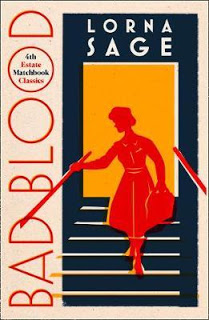
Grandfather’s skirts would flap in the wind along the churchyard path and I would hang on. He often found things to do in the vestry, excuses for getting out of the vicarage (kicking the swollen door, cursing) and so long as he took me he couldn’t get up to much. I was a sort of hobble, he was my minder and I was his. He’d have liked to get further away, but petrol was rationed. The church was at least safe. My grandmother never went near it – except feet first in her coffin, but that was years later, when she was buried in the same grave with him.Rotting together for eternity, one flesh at the last after a lifetime’s mutual loathing. In life, though, she never invaded his patch; once inside the churchyard gate he was on his own ground, in his element. He was good at funerals, being gaunt and lined, marked with mortality. He had a scar down his hollow cheek, too, which Grandma had done with the carving knife one of the many times when he came home pissed and incapable.
He and Nurse Burgess, now MB for short in the diary, pedal to paradise every day of the week, including Sunday. Trailing a cloud of midges, they’d hump their bikes off the road, through some muddy gateway and, behind the hedge, hug and knead each other among the mallows and Queen Anne’s lace and nettles dusty with pollen.
This is another aspect of rural life that’s lost now that the middle-class diaspora has populated the countryside with property-owning vagrants: the peculiar hell of having to live with such substantial ghosts from your past.
Farming life seemed a perpetual-motion machine, or an effect of gravity, something cyclic and unstoppable. Actually, it was because this kind of small-scale tenant farming was vanishing that the impression was so strong. Ways of life have been dying out in rural England time out of mind, at least for two hundred and fifty years since the great wave of eighteenth century enclosures. It’s the sense of an ending that’s timeless. The best symbol of this version of pastoral is a rusting and discarded piece of farm machinery in the corner of a field.
The grandparents weren’t grateful. They both felt so cheated by life, they have their histories of grievances so well worked out, that they were owed service, handouts, anything that was going . . . . Did they love me? The question is beside the point, somehow. Certainly they each spoiled me, mainly by giving me the false impression that I was entitled to attention nearly all the time. They played. Theywere like children, if you consider one of the things about being a child is that you are a parasite of sorts and have to brazen it out self-righteously.
My parents’ plan was that I should go to a Church Home for Unmarried Mothers, where you repented on your knees (scrubbed floors, said prayers), had your baby (which was promptly adopted by proper married people) and returned home humble and hollow eyed. Everyone would magnanimously pretend that nothing had happened, so long as you never seemed to be having a good time or developing too high an opinion of yourself – from now on you could count yourself lucky if they let you learn shorthand and typing. . . My father was appalled and also triumphant. Just as in the old days he’d done his best to beat vicarage corruption out of me, now he righteously denounced me for my scandalous offence against decency, monogamy, and my mother. He galloped off on his high horse, chivalrously saving her once again from the horrible past. . . .
